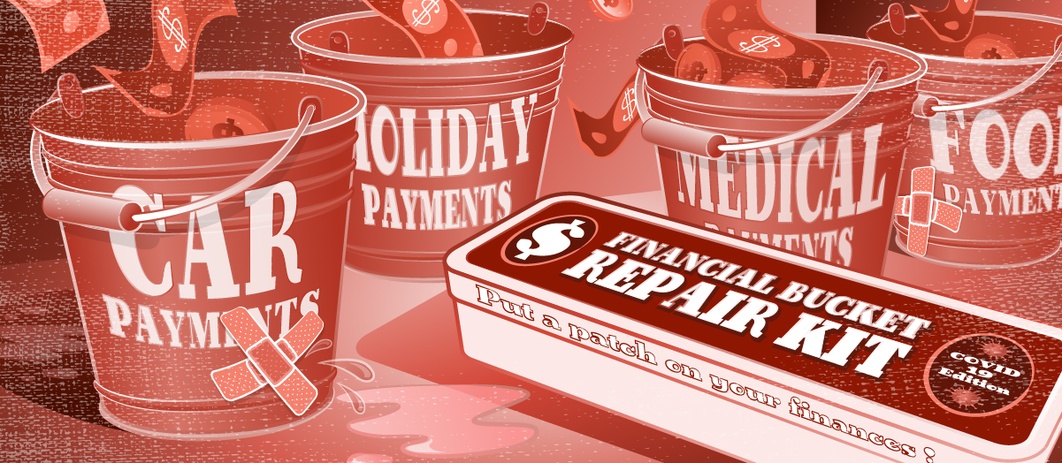
Andrew Hallam
29.07.2020
Reduce Financial Stress During COVID-19
_
There’s no way to know how long this will last. The world is at war with COVID-19. We self-isolated, closed businesses and case numbers dropped. But while we open up again, another wave might begin. This adds stress on several levels. We worry about health; we worry about the economy; and we worry about our incomes if we’re unable to work.
Perhaps we can’t control our income, especially if we lose our jobs. But we might find ways to spend a lot less. One such example might be sitting in your garage. According to Experian, Americans owe about $1.2 trillion in auto loans. Eighty-five percent of new cars are financed. Average payments are $554 per month. That’s a whopping $6,648 per year, per car. Couples with two cars might pay more than $13,000 a year in auto debt payments. This isn’t just an anchor that Americans face. Many Europeans also seek identity through their cars.
But during times of war (and COVID is a war) it helps to fortify your bunker. That might mean fixing holes at the bottom of your money buckets. If you’re making car payments and you worry about your job, consider selling your set of wheels. This could free up some cash if the going gets tougher.
If you live in a city, you might not need a car. Public transport might work. But you could also consider buying something used. This aligns with Dave Ramsey’s thinking. The popular, no-nonsense financial radio-show host says most people spend far too much money on cars. We usually borrow money to buy them. Then they drop in value every month.
Sam Dogen, founder of the blog Financial Samurai, lays out a car buying formula that the FIRE community loves. He says nobody should spend more than 10 percent of their annual income on a car. That means someone who earns $50,000 a year shouldn’t spend more than $5000 on a car. Someone who earns $100,000 annually shouldn’t spend more than $10,000.
This might sound extreme, but so is COVID-19. It could also go a long way to reduce financial stress. I’ve always recommended low-mileage used cars. My latest car purchase was a used 2004 Volkswagen Golf. It cost me $4,512, including taxes. That’s less than most people with car loans pay every year. We also own a 2006 Toyota Yaris. That cost us $6000.
According to PolicyAdvice.net, the average American drives about 13,474 miles per year. If a car is well maintained, the true age of the car is revealed by how far it has traveled. For example, when we bought our Volkswagen Golf, it had been driven about 60,000 miles. It was 12 years old, but it had as much wear and tear as a typical 4-year old car. It was a similar case with our Toyota Yaris.
This brings me back to COVID-19 and opportunity cost. This viral war could ebb and flow for years. If you’re worried about your job, reduce your liabilities. Pay off high interest credit card debt first. Then, if your car is worth more than twice what I last paid, go ahead and sell it to buy something cheaper. After that, build a war chest of cash whenever you’re employed. Make sure it totals at least 3-6 months of living expenses. After doing so, you’ll breathe with more ease if the COVID war ramps up. This could drag on, so make sure you’re prepared.
Andrew Hallam is a Digital Nomad. He’s the author of the bestseller, Millionaire Teacher and Millionaire Expat: How To Build Wealth Living Overseas
Swissquote Bank Europe S.A. accepts no responsibility for the content of this report and makes no warranty as to its accuracy of completeness. This report is not intended to be financial advice, or a recommendation for any investment or investment strategy. The information is prepared for general information only, and as such, the specific needs, investment objectives or financial situation of any particular user have not been taken into consideration. Opinions expressed are those of the author, not Swissquote Bank Europe and Swissquote Bank Europe accepts no liability for any loss caused by the use of this information. This report contains information produced by a third party that has been remunerated by Swissquote Bank Europe.
Please note the value of investments can go down as well as up, and you may not get back all the money that you invest. Past performance is no guarantee of future results.
